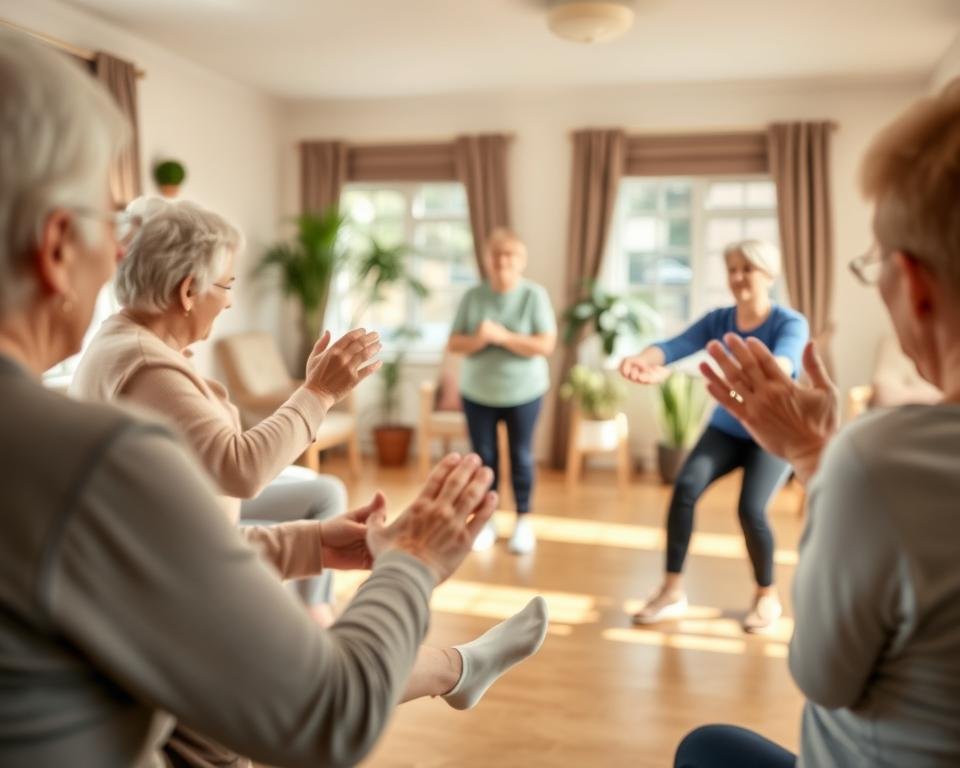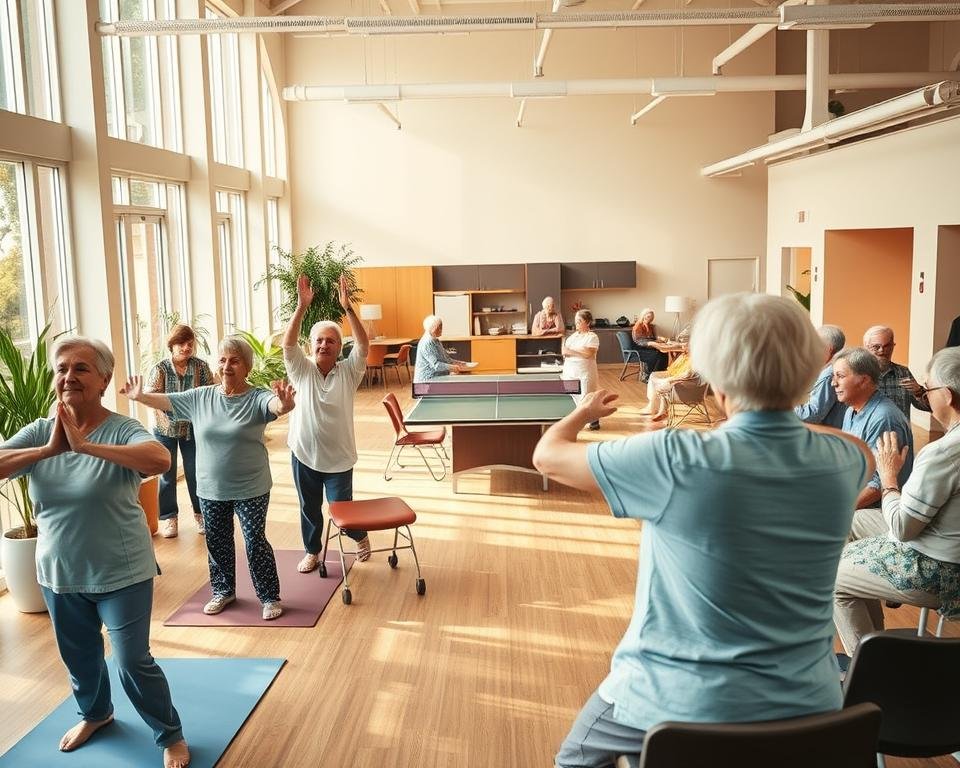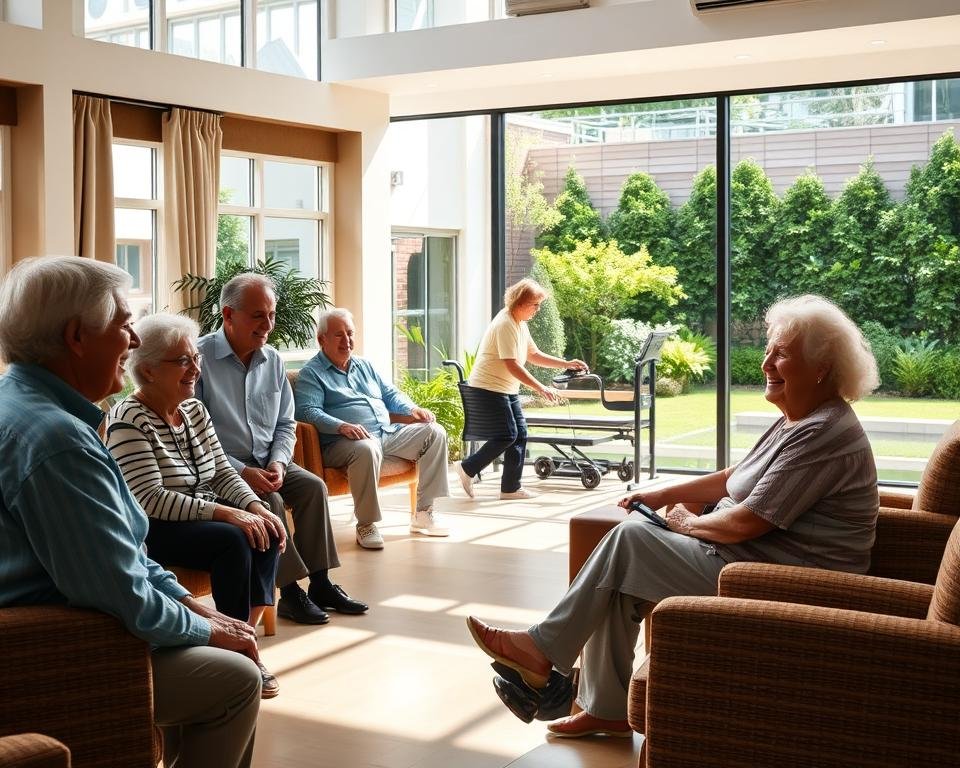As the sun set over the assisted living community, Margaret watched an art therapy session. Each brush stroke lifted spirits. For Margaret, it was more than a hobby. It helped her fight loneliness and depression. This showed how important therapy is for seniors’ quality of life.
The number of elderly people is rising. Geriatric therapy programs meet their complex needs. They offer specific support that fits into daily life. With more seniors facing mental health issues, assisted living places focus more on rehabilitation. Next, we’ll look at therapies that help seniors like Margaret find joy and purpose again.
Key Takeaways
- Therapy programs are essential for addressing the mental and emotional needs of seniors.
- Assisted living therapy programs enhance residents’ overall well-being.
- There is a growing need for personalized geriatric therapy programs.
- Comprehensive rehabilitation programs for seniors are increasingly prioritized.
- Therapy supports the fight against anxiety, depression, and cognitive decline.
Understanding the Importance of Therapy Programs
Therapy programs are crucial in assisted living homes. They give seniors the mental and emotional help they need. Through activities like counseling and group therapy, they boost brain power and emotional strength. Senior living therapy programs really help improve life by making social bonds stronger and offering ways to handle mental health issues.
What Are Therapy Programs?
Therapy programs in assisted living are set up to help seniors emotionally and mentally. They mix cognitive and emotional therapies to help with problems like sadness, worry, and feeling alone. These activities, like talking one-on-one, group chats, and art and music therapy, encourage thinking and sharing feelings.
Benefits of Therapy in Assisted Living
Therapy programs in assisted living offer many benefits. They help seniors make friends and feel less lonely. People say they feel happier and more ready to do daily tasks. Therapy gives seniors ways to handle stress and deal with changes in life, making them feel better emotionally.
How Therapy Supports Mental Health
Good therapy is key for seniors’ mental health. Staying involved in cognitive therapies keeps their minds sharp and fights mental slowdown. Emotional therapies let them express feelings and solve old problems, leading to clearer emotions. Together, these therapies build a safe place for personal growth and healing.

Types of Therapy Programs Available
In assisted living, various therapy programs aim to boost physical and emotional health. These are crucial for promoting healthy living, especially in seniors. Included are three main therapy types, each with different benefits for wellness.
Physical Therapy Options
Physical therapy helps increase mobility and strength. Therapists customize approaches for seniors, assisting with injury recovery or chronic issues. Exercises aim to improve balance, flexibility, and stamina, key for aging individuals.
By joining these sessions, residents see better daily function and independence.
Occupational Therapy Overview
Geriatric therapy programs include occupational therapy to restore daily living skills. Therapists guide seniors through tasks like dressing, cooking, and handling medications. This therapy also boosts cognitive health, aiming for independent, safe living.
Recreational Therapy Activities
Recreational therapy focuses on cognitive and emotional health through fun activities. Seniors enjoy arts, music, and games, enhancing social connections and community feel. These activities support mental health and integrate into broader wellness plans.

Assisted living offers a variety of therapy options for senior well-being. Focusing on physical, occupational, and recreational therapy, these facilities support health and social bonds. For details on specific programs, visit this resource.
How to Choose the Right Therapy Program
Choosing the right therapy program is crucial for seniors in assisted living. It’s important to understand their needs and the quality of programs available. Thoughtful consideration and research are key in finding the right therapy programs.
Assessing Individual Needs
Every person has different needs in rehabilitation programs. A detailed assessment helps families know if physical, occupational, or recreational therapies are needed. These assessments make sure seniors get the right support to improve their well-being.
Evaluating Program Quality
The quality of therapy programs is very important. Families should look into the staff’s qualifications, available therapy services, and how well residents do afterwards. Places like Village Walk offer many resources that help make wellness programs in assisted living work well. Knowing these things helps families pick the best options for their loved ones.
Asking the Right Questions
Asking important questions is key when you’re choosing a therapy program. You should ask:
- What specific therapy programs are available?
- How often are sessions held, and what is the typical duration?
- What qualifications do the therapists hold?
Getting answers to these questions helps families feel sure about their choices for rehabilitation support. For more advice, check out rehabilitation options at well-known places.

Incorporating Family Involvement
Family involvement is key in the care of assisted living residents. Loved ones offer emotional support that makes a big difference. This support helps fight loneliness, improving mental health for residents.
Benefits of Family Participation
Families know their loved ones well, which helps a lot in their care. Their input can make emotional therapy better, fitting the resident’s needs. Visits from family boost happiness and lessen depression.
Their active role in care planning is empowering. It ensures the care meets the resident’s specific needs.
How to Encourage Family Engagement
A warm atmosphere invites more family involvement. Assisted living places should keep families updated, host visits, and organize events for them. These actions create a strong bond that benefits everyone’s therapy journey.
Families bring new views, helping the care team plan better. This is crucial for keeping up with memory care trends. For more about family involvement benefits, visit here and here.
Success Stories from Assisted Living Therapy
Many people living in assisted living homes have seen big changes thanks to therapy. These programs do more than help physically. They boost mood and help folks make friends, which is key for a better life quality.
Real-Life Transformations
An amazing story is about a lady who found happiness again with emotional therapy. She was feeling very lonely. But then, she tried art therapy and fell in love with painting. This not only let her share her feelings but also helped her make friends with others who like painting too.
Testimonials from Residents and Families
Families have seen their loved ones improve a lot with these therapies. One family said,
“Since my father started participating in music therapy, he has become more animated and social. It has truly brought back memories and happiness into his life.”
Stories like this show how therapy in assisted living can really make a difference.

The Role of Trained Professionals
The role of trained pros is vital in giving good therapy in assisted living. A skilled therapy team makes sure residents get top-notch care that meets their needs. These experts must have the right qualifications and keep learning about new therapy methods.
Qualifications of Therapy Staff
Therapy pros need the right certificates in physical and occupational therapy. These qualifications mean they’re good at helping seniors get better and function well. They must keep learning to offer care that fits each resident.
Ongoing Training and Development
Staff in occupational therapy must keep learning to stay effective. They use new strategies and proven methods to help seniors. Workshops and team training help them improve their skills for better resident care.
Technology in Therapy Programs
Technology is changing how assisted living wellness programs work. Seniors want more reachable and interesting ways to stay well. Through telehealth, they can talk to mental health pros from afar. This makes getting help much easier.
These changes greatly help seniors’ cognitive therapy, offering custom help and support.
Telehealth and Remote Therapy Options
Telehealth has transformed therapy in assisted living places. It lets residents have therapy through video calls. This is great for people who have trouble moving around or like staying in their own space.
Seniors can get care that meets their needs better online. This leads to improved mental health.
Innovative Tools and Techniques
New tools and methods are making therapy better. For example, virtual reality lets seniors face fears or practice talking to people safely. Plus, there are apps for keeping an eye on mental health and managing behavior.
These apps help seniors stay engaged in between sessions. Also, devices that check vital signs help create therapy plans that fit the person better. This improves overall health.
Future Trends in Therapy for Assisted Living
Assisted living is changing, with more focus on personalized therapy that meets each resident’s needs. This means creating therapy plans that understand everyone is unique. This approach aims to improve happiness and health for each person living there.
Growing Demand for Personalized Care
Rehab programs for seniors now pay more attention to both physical and emotional health. Facilities are adding emotional therapy to address mental wellness. This move shows understanding that care must be tailored to individual likes and needs, leading to happier lives for residents.
Innovations on the Horizon
Innovation will soon change how therapy is done in assisted living. New technologies and whole-person care approaches are on their way. They will keep therapy relevant and impactful. By working together, health providers and living facilities will make therapy more engaging and supportive.
